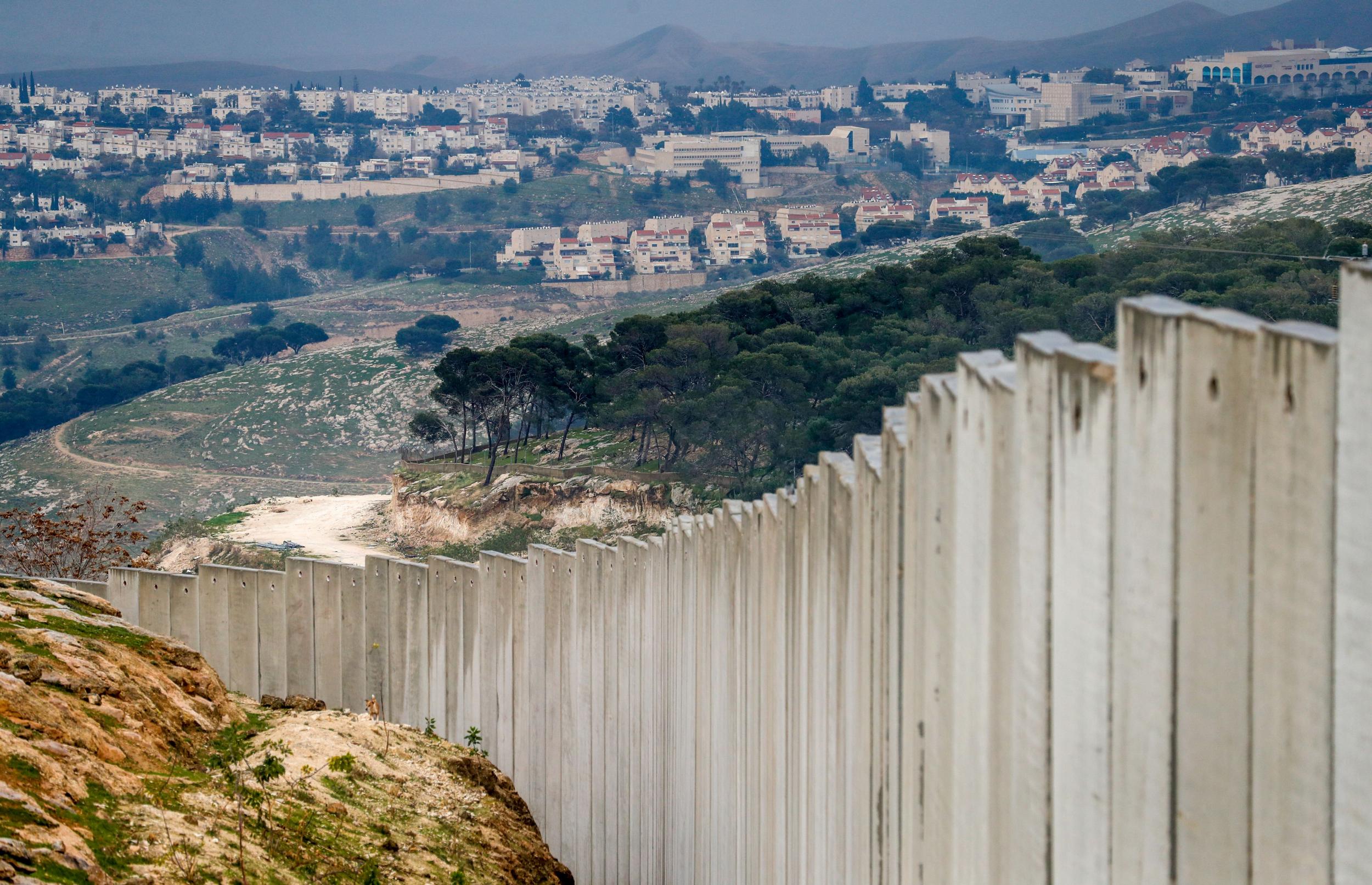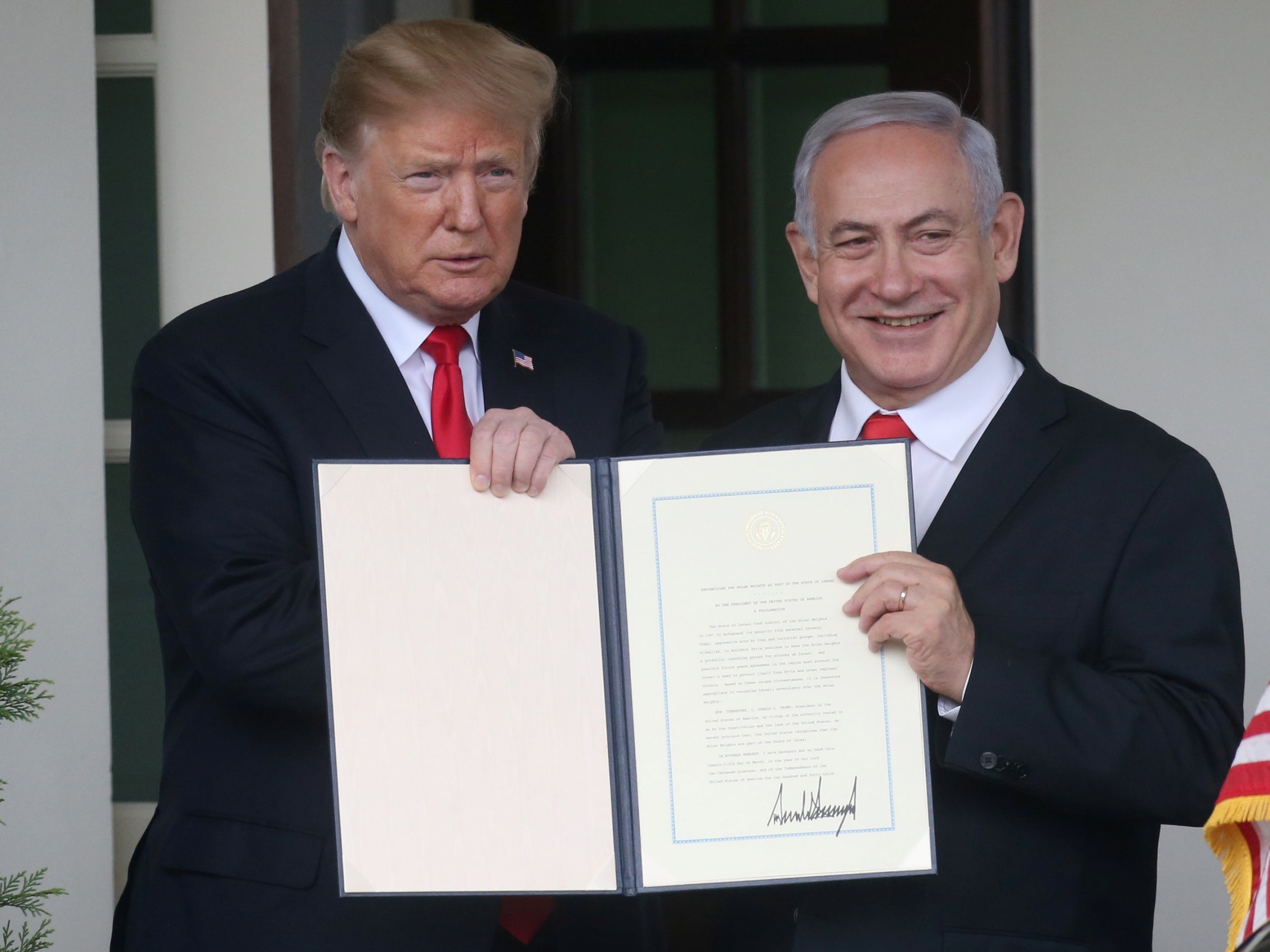Netanyahu can gobble up the West Bank and the EU will do nothing
European foreign ministers agree that annexation is against international law and that the theft of other people’s territory is anathema to the core principles of the EU. But the union has a long history of turning a blind eye, reports Robert Fisk


Annex away, Israel. The EU may huff and puff and ruffle through its faded pages of international law. But if Bibi and Gantz decide to gobble up more Arab lands by the mouthful in a month’s time – all the Jewish colonies on stolen land, the entire Jordan river bank and lots of morsels in between – the EU will do absolutely nothing. Zero. Zilch.
Romantics in Europe, even in Israel, may still cling to the wreckage of old dreams; that Israel cannot afford to upset one of its biggest trading partners – glorious civilisational, law-abiding Europe – by stealing vast swathes of territory that doesn’t belong to it. But the spars and struts and lifeboats of the old legalistic EU were only ever illusions. Whether or not the revolving-chair prime ministers in Jerusalem wait until 1 July to announce their final chapter in Israel’s history of colonial exploitation, Europe has acquiesced for so long in this country’s vile treatment of the Palestinians that Europeans are going to have to sit back and accept this final slap in the face from Israel.
There’s been much codswallop written in the past few days about Europe’s unfortunate divisions; that Israel, for example, can always rely on Hungary and Poland to stand by their cruel policies – and destroy any hope of a joint EU declaration on the continuation of a land theft that dwarfs even Russia’s aggression in the Ukraine. Indeed, we’ve even heard it remarked that there can be no comparisons between the two annexations. Giant Russia was occupying the land and property of a small sovereign state on its border. Outrageous. Israel, on the other hand, isn’t doing anything of the kind on the West Bank or in east Jerusalem or Golan – because the Palestinians never did have a state, did they? When was there ever a Palestinian nation? Quite so. Tut-tut.

And so on and so forth. At his latest swearing-in ceremony in Jerusalem, Benjamin Netanyahu described extended Israeli sovereignty in the West Bank as “another glorious chapter in the history of Zionism”. Well, it certainly isn’t going to provide another glorious chapter in the history of the EU. After all, as long ago as 2009, Javier Solana, after 10 years as EU foreign policy head, told an Israeli audience in Jerusalem that “Israel is, allow me to say, a member of the European Union without being a member of the institutions…No country outside the continent has the type of relations Israel has with the European Union”
Too true. Not that you’d know it by reading through the stream of accusations of anti-semitism and racism that Israel has levelled against European nations over past decades. But then, what’s to lose if your target is a wealthy land-mass which calls itself a “community” but which scandalously failed to end a war that burst into ethnic hatred in the 1990s, leaving it to the US to close down the conflict? Bosnia lay between EU members Austria and Greece when Germany effectively took Croatia’s side in the ethnic war, and Greece supported Serbia. The British – now I suppose absolved of the terrible crime of membership of such a conglomerate – were no less miserable in their response, refusing to recognise Serb aggression and insisting (Malcolm Rifkind, please note) that this was a civil war in which Europe must not become involved.

Given that awful history, you might question why Israel – or the Palestinians, for that matter, given the 1917 Declaration by one of Rifkind’s predecessors – wants to make any deals at all with EU leaders. An untrustworthy bunch of chaps, you might think, even without the Brits. Yet the Israelis are smart enough to know that while Trump may be exalted now as Israel’s greatest friend, he is also a lunatic who may not be returned this November. Chaotic as it is, the EU will still be around in November and for long afterwards.
But the EU’s problem with Israel is perhaps best illustrated by the predicament of Nato, whose principal sponsor is the US but many of whose members belong to the EU. Israel and Nato have often taken part in joint military exercises in the Mediterranean, the Red Sea, and from Brussels to Ukraine. In 2006, Israel became the first non-European country to reach an “Individual Cooperation Programme” with Nato. American political commentator Diana Johnstone has drawn attention to a statement made to a Nato-Israel seminar in Herzliya in 2006 when the then Israeli foreign minister Tzipi Livni said that “the alliance between Nato and Israel is only natural…In many ways, Israel is the front line defending our common way of life.”
As Johnstone pointed out, “not everyone in European countries would consider that Israeli settlements in occupied Palestine reflect our common way of life”. By chance, I made the same point when I spoke to a meeting of Nato leaders in Spain some years afterwards which included Admiral Mike Mullen, US chairman of the joint chiefs of staff. My remarks were greeted, of course, with icy silence. But therein, I suspect, lies the EU’s real fear: contamination of its own high principals with the greed of colonial adventurers in a state whose public principles (democracy, peace, the rule of law, etc) might in other ways mirror their own. Stealing other people’s land is therefore not something the EU can be seen to applaud.

In an attempt to distance itself from this mass territorial theft, it has chosen – at least until the arrival of the Trumpian lunatic asylum – to reflect the pusillanimous US response: to claim that building homes for Jews and Jews only on Arab land was “not helpful to peace”. Even when the Swedes drafted an EU proposal in 2009 for east Jerusalem to be a future Palestinian capital, at a time when the two-state solution was still (just) regarded as a possibility – and at a time when Netanyahu (yes, the same man) had proposed a 10-month settlement freeze — Israel responded by claiming that the proposal harmed the European Union’s ability to participate in the “political process” between Israel and the Palestinians. The objection to this was that under the EU’s proposal, east Jerusalem would be the capital of “a viable and contiguous ” state – thus effectively preventing Israeli colonies from surrounding the city.
In an attempt to distance itself from this mass territorial theft, the EU has chosen – at least until the arrival of the Trumpian lunatic asylum – to reflect the pusillanimous US response: to claim that building homes for Jews and Jews only on Arab land was ‘not helpful to peace’
Repeatedly, however, the EU’s concern has been directed at Israel’s attempt to regard its colonies as an essential part of the state – as if they already were annexed – and to prevent any trade deal suggesting that the colonisation is a fait accompli in the West Bank. In 2013, the EU issued guidelines forbidding support to Israeli businesses, institutions or individuals operating from the Palestinian territories. This, declared the Israelis, was “interference”. It was “unhelpful”, a word normally applied by the Americans (in pre-Trump days, of course) to the further construction of Jewish settlements for Jews and Jews only on occupied Arab land.
Two years later, the EU proposed to label products from Israeli settlements in the occupied West Bank, east Jerusalem and Golan. This, the EU were then told, would undermine the chances of further peace negotiations. The EU was not, it should be noted, refusing to sell products from the occupied territories, merely insisting that consumers should know the provenance of the products they might be buying. I myself recall purchasing grapes in Ireland during this period which were labelled with a Jerusalem telephone number. I called the number. The grapes had come, of course, from a Jewish settlement in the West Bank.

But the Israeli response was out of all proportion. Merely to label any product from these settlements amounted to a boycott of the Israeli state. What the Israelis were really worried about was that an EU separation of products which came from the occupied territories would quickly morph into the international boycott campaign against Israel itself. But individual EU nations were not themselves immune from Israel’s criticism.
When Sweden’s new Social Democratic-Green party recognised the “State of Palestine” in 2014, it was castigated for its decision, since “Palestine” did not meet the “traditional criteria” of statehood – exercising government control over a defined territory, etc – and thus obstructed the idea that a lasting peace between Israelis and Palestinians should be the result of a negotiated settlement. It was as if the Palestinians rather than the Israelis were responsible for their own occupation. There then followed a series of accusations against Sweden as an anti-semitic nation, which as a Second World War neutral had traded with the Nazis — shipping iron ore to Germany (this was true) — but whose help for thousands of Jews fleeing to Swedish territory from Denmark during that same war was singularly ignored. At least 7,500 Danish Jews were smuggled to safety in Sweden in 1943.

When in 2009 the UK — then of course, a leading member of the EU – initially allowed a warrant to be issued in London at the request of pro-Palestinian activists to arrest Mrs Livni for war crimes during Israel’s 2008 war in Gaza – Israel castigated the British authorities. This was a “diplomatic offence”. But as Sir Geoffrey Bindman, the specialist in human rights law, said at the time, those who come to Britain “are subject to its laws”. Many countries, including the UK, now gave their courts jurisdiction to try specific crimes committed outside their own territory. Mrs Livni cancelled her trip to the UK.
Yet Israel showed scant concern for any “diplomatic offence” when its Mossad agents used fake EU passports – including British, French, Irish and possibly German documentation – to send a Mossad assassination squad to Dubai to successfully murder a Hamas agent in 2010. In 1997, it had equipped a would-be murder squad with Canadian passports to kill the head of the Hamas political bureau, Khaled Meshal, in Amman. The agents were caught and the Jordanians forced Netanyahu (yes, again he was involved) to provide them with the antidote to the poison which the Mossad men had injected into their target.
Interestingly, my own (paper) archives show that the Israelis gave three of six operatives engaged in a raid on Beirut in 1973 fake British passports – just four months after the UK became a member of the EU. Other Israelis had entered Beirut at the same time with Belgian and (then) West German passports in their mission to kill three Palestinian guerrilla leaders. Other Palestinians fighters and Lebanese security operatives and several innocent civilians were killed by the Israelis, who were apparently taking revenge for the Munich Olympics massacre. The Israelis ignored the British complaints.

Paradoxically, the West’s protests over Israeli law-breaking – for forgery rather than murder – never stopped European military cooperation with Israel. Italy’s most senior military officer, for example – in his role as chairman of Nato’s military committee — visited Israel in 2009 for talks with the Israeli chief of staff General Gabi Ashkenazi. According to the Jerusalem Post, Admiral Giampaolo di Paola “was…interested in Israeli intelligence-gathering capabilities and methods [sic] which the IDF [Israel Defence Force] uses when operating in civilian population centres. He [di Paola] noted that Nato and the IDF were facing “similar threats: Nato in Afghanistan” and Israel in its war against Hamas and Hizballah.”
But it was Israel’s enlargement – its physical seizure and theft of Palestinian Arab land – that has most vexed the EU itself. In 2012, it was expressing “dismay” over new settlement building and promised that it would – this must have had them shaking in their shoes in Israel – “monitor the situation…and act accordingly”. It may have monitored. But it never acted. On 17 July 2013, Israel approved the construction of 741 West Bank homes for Jewish colonists just a day after the EU banned European funding for Israeli enterprises in occupied territory.
What lies behind this sensitivity – although few would be so insensitive to state it openly – is that the taking and keeping of other people’s territory through war is anathema to the very foundational core of the EU
What lies behind this sensitivity – although few would be so insensitive to state it openly – is that the taking and keeping of other people’s territory through war is anathema to the very foundational core of the EU. The European Economic Community came into existence to prevent further war between Germany and France. And it was Germany’s seizure of other people’s lands which led to the last war between those two nations.

There is no historical parallel. The Nazis, for example, were not attacked by the Austrians or by the Czechs or by the Poles. Israel was attacked by the Arabs in 1967. The Germans sought the annihilation of Europe’s Jews, and almost succeeded. Scarcely an EU country – save for the UK and a few neutrals – were not involved directly or indirectly in the greatest act of mass murder in modern history. And thus are in no position to lecture Israel about territorial aggression or war crimes. None has suggested that Israel is trying to commit genocide.
But the EU is now in the hands of a new generation whose liberal leaders want Israel to abide by international law, and whose right-wing leaders – Viktor Urban of Hungary, for instance – find themselves (incredibly) feted by Netanyahu himself. Israel has thus found itself in the enviable position of demanding the admiration of Europe for its international values while resurrecting Europe’s wartime crimes whenever Israel itself crosses those same values by stealing others’ lands or killing large numbers of Palestinians under the mantra of fighting “terrorism”.

It was Chris Patten, a former EU commissioner, who in 2010 called the blockade of Gaza an “immoral failure”, who has spoken most movingly about this European failure. But his most cogent argument came when he pointed out that international donors met most of the costs caused by Israel’s occupation — that should under the Geneva Convention be met by Israel itself; and that many EU projects had been reduced to rubble by Israeli forces. He asked how much longer the donors would continue this expenditure. Patten need not have bothered.
Fifty-three years of occupation that persists under your silence, your funding, your arms, and the spokesman for EU external affairs tells reporters who ask about sanctions not to put the cart before the horse
Gathering at a video conference last week, EU foreign ministers discussed the threatened Israeli annexations and their top foreign policy man, Josep Borrell, claimed that the Europeans would use their “geopolitical capacities” to influence the issue! Yes, most of the EU foreign ministers agreed, annexation was against international law. At present, Israel maintains its privileged position with EU goods subject to preferential tariffs under the mutual association agreement, and Israel participates in the research funding scheme known as Horizon 2020. As Irish EU analyst Naomi O’Leary has emphasised, the EU already does exclude products from the occupied territories from preferential tariffs. These goods could not be labelled “Made in Israel”, the EU’s court of justice decided last November.

Israel’s bravest writers have raged against the EU’s cowardice. “Fifty-three years of occupation that persists under your silence, your funding, your arms, and the spokesman for EU external affairs tells reporters who ask about sanctions not to put the cart before the horse,” Gideon Levy wrote in Haaretz with his usual steel pen. “The European Union’s…Horizon 2020 joint research projects are in danger. That’s Europe’s response to annexation. Stopping joint research projects will prevent occupation. Don’t make Israel and the settlers laugh…”
Levy, I admit, is a great friend of mine. Sometimes he goes a bit over the top. But I was pulled up short by one of his final remarks in Haaretz this month: “Europe, which was silent and closed its eyes in the past,” he said, “is doing it again.”
Join our commenting forum
Join thought-provoking conversations, follow other Independent readers and see their replies
Comments